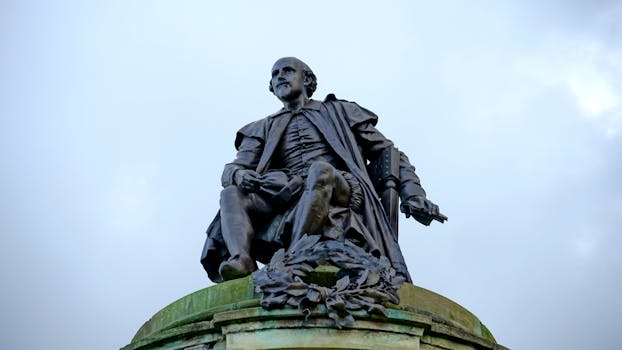William Shakespeare: The Bard of Avon

William Shakespeare, often referred to as the Bard of Avon, is widely regarded as one of the greatest playwrights and poets in history. Born in 1564 in Stratford-upon-Avon, England, his works have transcended time, language, and culture, captivating audiences for over four centuries. His extensive body of work includes 39 plays, 154 sonnets, and two long narrative poems. Despite the passage of time, Shakespeare's influence on literature, theatre, and the English language remains profound.
Early Life and Education
William Shakespeare was born on April 23, 1564, to John Shakespeare and Mary Arden. His father was a successful glove-maker and local politician. Though specific details about his education are sparse, it is generally believed that he attended the King's New School in Stratford. This institution would have provided him with a solid grounding in Latin literature and rhetoric, essential skills for his future career.
Shakespeare's early life remains somewhat shrouded in mystery due to limited records. However, it is known that he married Anne Hathaway in 1582 and had three children: Susanna, Hamnet, and Judith. The years following his marriage are often referred to as the "lost years" because little is documented about his activities during this period.
Literary Career
Shakespeare's literary career began to flourish in the late 1580s when he moved to London. By 1592, he was already making a name for himself as an actor and playwright. His early works include "The Comedy of Errors" and "Titus Andronicus," showcasing his versatility in both comedy and tragedy.
His plays were performed at various venues across London, most notably the Globe Theatre, which he co-owned. The Globe became synonymous with Shakespeare's work and was pivotal in shaping the theatrical landscape of the era. His plays cover a wide range of themes including love, power, jealousy, betrayal, and ambition.
- Comedies: "A Midsummer Night's Dream," "Much Ado About Nothing"
- Tragedies: "Hamlet," "Othello," "Macbeth"
- Histories: "Henry V," "Richard III"
Poetry
In addition to his plays, Shakespeare was also an accomplished poet. His collection of sonnets, published in 1609, explores themes of love, beauty, politics, and mortality. The sonnets are considered some of the most important contributions to English poetry.
Shakespeare's two narrative poems, "Venus and Adonis" and "The Rape of Lucrece," were published during a period when the plague forced theatres to close. These works were well-received and contributed significantly to his reputation as a literary figure.
Legacy
Shakespeare's influence extends far beyond his lifetime. His works have been translated into every major language and are performed more often than those of any other playwright. His ability to capture the human condition in its myriad forms has made his plays timeless.
The Bard's impact is evident not only in literature but also in modern culture. Phrases like "to be or not to be" from "Hamlet" and "all the world's a stage" from "As You Like It" have entered common parlance. His works have inspired countless adaptations across various media including film, television, and even TED Talks that explore his enduring relevance.
TED Talk on Shakespeare's Relevance
A notable TED Talk on Shakespeare's lasting impact is given by John McWhorter titled "Txtng is killing language. JK!!!". McWhorter discusses how language evolves over time but highlights how Shakespeare's use of English has remained a cornerstone for understanding linguistic beauty.
This talk delves into how Shakespeare's inventive use of language has influenced modern communication methods. McWhorter argues that just as texting has created new forms of expression today, Shakespeare's work did so in his time by coining new words and phrases still in use today.
Table: Major Works of William Shakespeare
| Category | Notable Works |
|---|---|
| Comedies | "A Midsummer Night's Dream," "Much Ado About Nothing" |
| Tragedies | "Hamlet," "Othello," "Macbeth" |
| Histories | "Henry V," "Richard III" |
| Sonnets | "Sonnet 18," "Sonnet 130" |
| Narrative Poems | "Venus and Adonis," "The Rape of Lucrece" |
William Shakespeare's enduring legacy as the Bard of Avon is a testament to his unparalleled contribution to literature and theatre. His works continue to captivate audiences around the world with their timeless exploration of human nature.
The breadth of Shakespeare’s influence is vast—from shaping the English language to inspiring contemporary discussions about communication methods as seen in TED Talks like John McWhorter's presentation. As we continue to study and perform his works, it becomes clear that Shakespeare’s relevance remains undiminished through the ages.